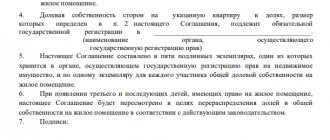When divorcing a spouse and dividing jointly acquired property, it is necessary to take into account that the husband or wife sometimes has personal property that the law will not allow to be divided. This is something that was acquired before legal marriage, given as a gift, privatized or inherited.
In our article we will consider the question of whether a gift apartment belonging to one of the spouses is divided during a divorce.
Is property received under a gift agreement subject to division?
By default, donated property cannot be divided, but it all depends on the current property regime between the spouses and other circumstances. There are two such regimes in Family Law:
- Law. Valid from the moment of marriage until the divorce. Valuables purchased during this period are considered shared.
- Negotiable. Valid if the spouses have entered into a marriage contract. The legal regime is abolished: the parties can determine as they please who gets what. But it is important to do this in such a way that the situation of the husband or wife does not worsen, otherwise the court may declare the contract invalid (Article 44 of the RF IC
The specifics of the division of property donated during marriage directly depend on the current property regime in the family. If a marriage contract is not concluded, the gift remains with the person to whom it is intended. If there is a contract, everything is divided according to its provisions.
Important! Based on Art. 37 of the RF IC, it is possible to recognize the property of one of the spouses as joint property. The main condition is that its value must be significantly increased through general investments.
Example:
Several years before marriage, the man’s parents gave him a private house with a plot of land. After that, he got married and lived with his wife for 20 years. During this period, an extension was made to the house (another room), plus a bathroom.
The couple decided to divorce. After the divorce, the woman filed a lawsuit to recognize the house as common property and to divide it in half. If she had not made a request to recognize the housing as common, the property would have been divided only taking into account the attached room and bathroom, because they appeared after marriage. The rest would remain with the man.
As evidence, the plaintiff presented witnesses who testified and confirmed:
- In marriage, a woman worked on an equal basis with a man, therefore, major repairs and construction work were carried out with common money. But even if she did housework, the money spent would still be considered shared.
- The renovation itself was carried out during the marriage.
In addition to the witnesses, the plaintiff presented part of the remaining receipts for payment for repair materials, as well as an expert opinion. The appraiser confirmed that the value of the house at the time of filing the claim was 7,000,000 rubles, and was increased from the moment of donation until the woman went to court precisely due to joint investments.
Having considered the case, the court recognized the house and land as common and allocated ½ share to the spouses. Later they sold the property and divided the money equally.
If the property is gifted to both spouses
Most often, both spouses are given valuables for a wedding or other special event. It all depends on the content of the gift agreement:
- If a husband and wife act as recipients at once, the property remains with them according to the donated shares. That is, the composition does not change.
- If the recipient is only one of the spouses, he will have to prove in court that the value of the gift has increased due to the common money in the marriage.
It is more difficult if one of the spouses was given money before the wedding, and then it was invested in the purchase of real estate after the marriage. Here you will have to prove the origin of the funds, and only after that the court will divide the property in proportion to the invested amounts.
What property cannot be divided
Under no circumstances will it be possible to divide personal belongings and jewelry (except expensive ones), as well as copyrights and intellectual property rights. Property registered in the name of a child is not included in the division. Even if the parents bought it with common money and then drew up a deed of gift for the minor, it will remain with him.
Marriage contract and its conditions
If you are concerned about the procedure for donating an apartment after a divorce and dividing it when a marriage contract is concluded, you need to read its terms more carefully. It spells out the conditions for dividing all personal property if the spouses suddenly have to divorce. It is best to clarify in detail who gets what and what is to be shared. Moreover, in this agreement the interests of any of the parties should not be infringed, although the shares may be different: one is large, the other is smaller.
This method of dividing property is absolutely legal. The main thing is to draw up a document according to the rules of the law, so that when people get divorced, there will no longer be any difficulties in obtaining the property that is due to everyone. The method of concluding a prenuptial agreement is the best option to decide how to divide property between the owners.
How property is divided during divorce: basic principles
The most important principle that guides the courts when determining shares in the common property of spouses is equality. By default, they are allocated equal shares (Article 39 of the RF IC).
However, according to the claim, the court can increase the share of one of the spouses if the second during family life did not work without good reason or spent common money to the detriment of the interests of the family. It is also possible to increase the share in the interests of children.
Important! Do not forget that common debts are divided along with property. Their size for each is determined in proportion to the shares awarded.
Read more about the division of loans and debts between spouses during divorce
Division of a car purchased with credit funds
During a divorce, not only jointly acquired property is divided, but also all joint loans of the spouses. This also applies to car loan payments.
Until the loan is repaid, the car is not subject to division, since it is actually pledged to the bank.
What can you do in case of dividing a car taken on credit:
- buy the car from the bank, after which it ceases to be a “credit” car. Then in this case the spouses can divide the car according to their wishes;
- sell the car to a third party, after the sale pay off the debt to the bank and divide the remaining funds among each other;
- The car remains in the ownership of one of the spouses, while making single payments on the loan and reimbursing the second spouse for half the cost of the car;
- spouses have the right to agree that the car becomes the property of one of them with the payment of monetary compensation to the second, but at the same time the obligation to pay monthly payments to the bank remains with both of them;
- one of the former spouses can pay the debt in full to the bank, while the second spouse will be obliged to pay him monetary compensation in the amount of his monetary loan obligation.
Division of donated property in court
First, you need to collect documents and prepare evidence confirming the increase in the value of the donated property due to joint money. When everything is ready, you should file a claim with the district court at the defendant’s place of residence. If real estate is divided, documents are submitted to its location address.
How everything looks step by step:
- The plaintiff independently sends copies of court documents to the defendant. This obligation will be imposed on plaintiffs from 2021. The court will need a return receipt or other document confirming receipt of the materials by the defendant.
- The court receives a statement of claim for recognition of the values as common and division, as well as other documents. The judge considers everything within 5 days and makes a decision to accept the case for proceedings.
- At the hearing, the judge finds out how much the value of the donated valuables has increased and examines the supporting documents. If necessary, witnesses are questioned (if any).
- Based on the results, a decision is made and comes into force after 30 days.
When the decision comes into force, you need to obtain a certified copy of it and re-register ownership if the property has been divided.
Important! If the defendant or plaintiff does not agree with the decision, they can appeal it before it comes into force.
How to make an application
When filing an application, the plaintiff must provide the following information:
- name and address of the court;
- Full name, residential addresses of the participants in the case;
- dates of marriage, divorce;
- the date and basis for the defendant’s acquisition of divisible property as a gift;
- due to which the value of the valuables given to the defendant increased during the marriage;
- the market value of the property at the time of filing the claim;
- date of compilation and signature of the plaintiff.
You will need details of all documents confirming a previously registered marriage and general investments in the gift that is being divided.
Documentation
Along with the application, the plaintiff must submit a passport, a divorce certificate, and a receipt for payment of the state fee. You will also need evidence confirming the costs of the donated property:
- checks and receipts;
- Bank reference;
- scanned and certified copies of correspondence with the defendant.
If there are witnesses, you can request to call them immediately in the application.
State duty
When filing a claim, a state fee is paid depending on the value of the share that the plaintiff wants to receive (Article 333.19 of the Tax Code of the Russian Federation):
- Up to 20 thousand rubles. The duty will be 4%, minimum 400 rubles.
- 20-100 thousand rubles. 800+3% of the amount over 20 thousand rubles is paid.
- 100-200 thousand. The fee will be 3,200+2% of the amount over 100 thousand rubles.
- 200 thousand - 1 million. 5,200 + 1% of the amount exceeding 200 thousand is transferred.
- From 1 million. You will have to pay 13,200+0.5% of the amount over 1 million.
The maximum duty amount is 60,000 rubles.
Expert assessment of car value
In cases where it is not possible to independently determine the market value of a car, spouses can turn to the services of an auto expert who will help calculate the real price of the car, taking into account its rating on the market, natural wear and tear, year of manufacture and other characteristics.
It is important to know : a car examination is also carried out in the event of a dispute about the procedure for determining the use of a car. If one of the spouses uses the car alone and does not provide it for use by the other party, then you should contact the judicial authorities to resolve the dispute.
Then the court may order an examination, during which the expert will assess the real value of the car based on the documents presented, since the car will not be available.
The examination also solves another problem in the event of a dispute: an unscrupulous spouse, agreeing to divide a car, may deliberately underestimate or inflate its value in order to obtain greater benefits.
The expert’s conclusion will establish the real value of the car and the interests of the parties will not be violated.
An assessment of the actual value of the car can be carried out after its sale. This happens when a spouse, not wanting to share joint property, sells a car.
Division of donated property by agreement
It is impossible to draw up a standard agreement on the division of property to transfer donated values to the second spouse, because legally they belong to the person who received them in the first place. An agreement on the recognition of donated property is not provided for by general legislation.
The easiest option is to issue a deed of gift. If real estate or a car is donated, or the contract contains a promise of donation in the future, written form is required (Article 574 of the Civil Code of the Russian Federation). In other cases, it is enough to give the gift orally.
Important! When donating a share in property rights, the deed of gift is certified by a notary. In other cases, identification is not required. A transaction concluded between official spouses is not subject to tax (Article 217 of the Tax Code of the Russian Federation). If at the time of drawing up the contract the marriage has already been dissolved, the recipient will have to pay 13% of the value of the gift until July 15 of the year following the year of the transaction. The 3-NDFL declaration is submitted to them by April 30.
Documents and state duty
The list of documents depends on the type of gift. The most common gift is real estate. To conclude a contract you will need:
- passports of the parties;
- extract from the Unified State Register or certificate;
- a deed of gift previously executed in the name of the donor’s spouse.
If the certificate is required by law, a state duty is paid in the amount of 0.5 of the value of the gift, but not more than 20,000 and not less than 300 rubles.
In the future, you need to re-register ownership of the donee in Rosreestr, having paid 2,000 rubles in advance.
Division of an apartment if there is a minor child
If there is a child, the situation with the division of the donated apartment becomes more complicated. The law protects the rights of minors, so they cannot lose their place to live even if their parents divorce. In some cases, this means that the legal representative of the children designated by the court can live with them in the territory of the apartment donated to the ex-spouse. If the share of the donated premises belongs to a minor, it cannot be alienated even if a peace agreement is concluded between the parents.
In the event that in order to carry out the division it is necessary to sell the home, a purchase and sale agreement is concluded only with the consent of the guardianship and trusteeship authorities.
What could be the risks and how to avoid them?
Donating an apartment, along with advantages for the parties, also has disadvantages, which can be called risks of the transaction. Risks, as a rule, are associated with the donor, who, after transferring a gift or promise to transfer, may find himself in a situation where his state of health, property or family situation has changed for the worse, as well as when the behavior of the donee has manifested such intentional actions that create a threat life and health of the donor or his loved ones (how is the donated apartment divided after a divorce?).
The law provides for cases when the donor has the right to cancel a donation (Article 578) or a promise (Article 577) of the Civil Code of the Russian Federation.
Important! Another risk is that after the transaction the donor is deprived of his rights to the property, and the donee becomes the full owner and has the right to dispose of it at his own discretion, incl. and sale.
As you can see, the procedure for donating an apartment purchased during marriage between spouses is somewhat different from a similar transaction between relatives, because Due to the joint ownership regime, it is required to initially divide it and then donate it.
What is considered a gift
According to legal canons, it is considered that the receipt of a gift is considered accomplished when:
- there is a transfer of something considered a gift under a written gift agreement or by oral notification;
- someone receives a prize when participating in a drawing, promotion, contest or competition.
In this case, the fact of transfer of a gift can be:
- With the preparation of a simple or notarized written agreement. Such a gift is confirmed quite easily; you just need to provide a deed of gift.
- Through the simple presentation of a gift, both in front of witnesses and without them. Proving the fact of a gift in such circumstances is extremely difficult; here, proof will require the testimony of the donor himself, physical evidence, for example, an engraving on the gift, which will clearly indicate to whom the gift is intended, or other evidence.






